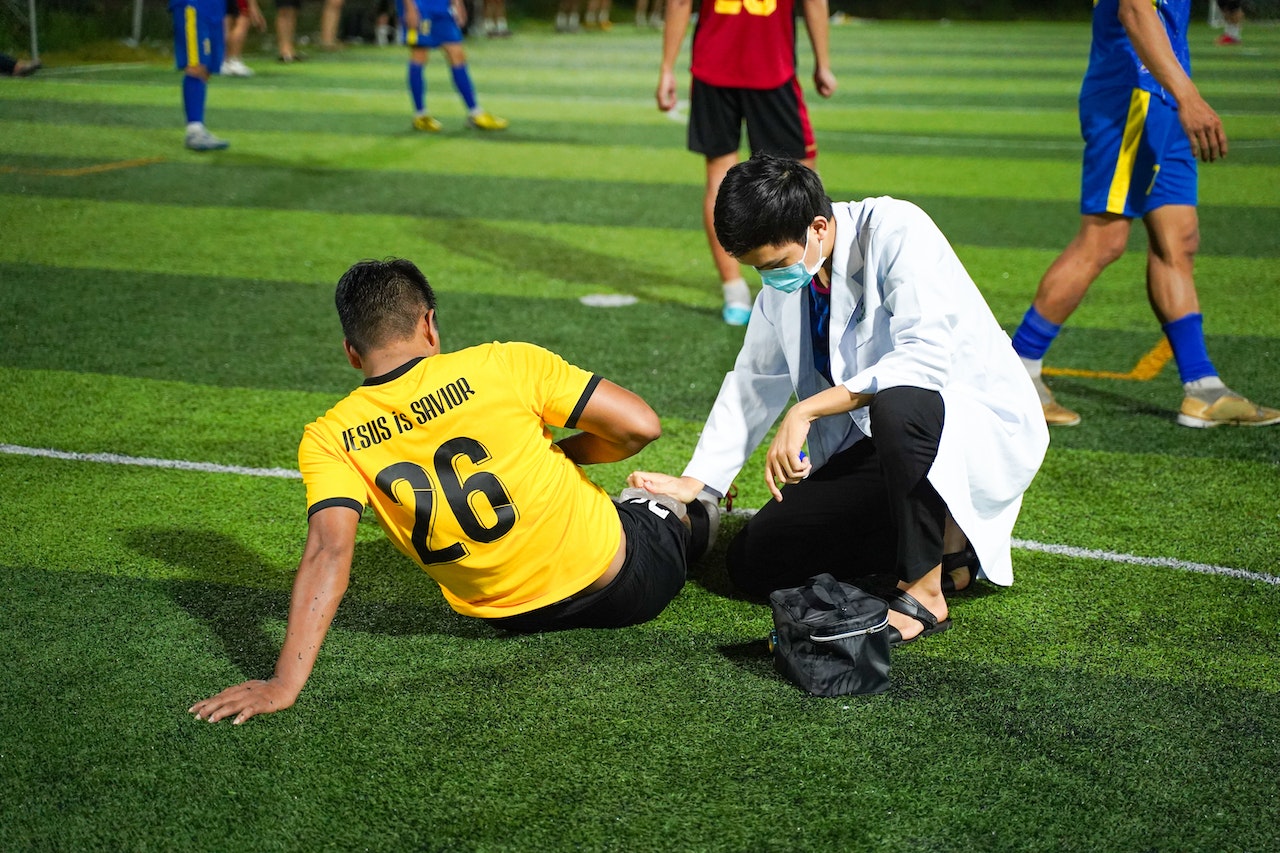7 Reasons Soccer Players Fake Injuries Or Flop
Despite the negative impact it has on the game, players continue to fake injuries, and it is becoming more and more prevalent in modern soccer. This behavior raises the question, why do soccer players fake injuries?
Author:Gabriel MartinezMay 24, 202315 Shares973 Views

Soccer, or football, is known for its fast-paced action, strategic plays, and, unfortunately, for the phenomenon of playersfaking injuries or "flopping." Flopping refers to when a player pretends to be injured or hurt in order to gain an advantage or deceive the referee into giving a free-kick, penalty or even a red card to the opposing team.
Despite the negative impact it has on the game, players continue to fake injuries, and it is becoming more and more prevalent in modern soccer. This behavior raises the question, why do soccer players fake injuries?
Some argue that it is a tactic to gain an advantage, while others believe it is a result of the high stakes and pressure in professional soccer. Read on to know the answer in detail.
Reasons Soccer Players Fake Injuries Or Flop
Gamesmanship
One of the primary reasons why soccer playersfake injuries is to gain an advantage over the opposing team. By faking an injury, a player can force the referee to stop the game, giving their team a chance to regroup or catch their breath. Moreover, if the referee awards a free-kick or a penalty, it can give their team an opportunity to score.
Time-Wasting
Another reason why soccer playersfake injuries is to waste time. In a game where time is of the essence, a few seconds can make all the difference. By pretending to be injured, a player can waste valuable time, which can be beneficial to their team, especially if they are winning.
Psychological Warfare
Faking an injury can also be a form of psychological warfare. It can be used to disrupt the opposing team's momentum or intimidate them. By stopping the game or drawing attention to themselves, a player can disrupt the flow of the game and put the opposing team on the backfoot.
Professional Fouls
Sometimes, players fake injuries to deceive the referee into giving a yellow or red card to the opposing team. This is often done through professional fouls, where a player intentionally commits a foul to stop a counter-attack or prevent a goal-scoring opportunity.
By pretending to be injured, a player can make the foul seem more severe than it actually was, leading to the opposing player being penalized.
Inadequate Refereeing
Lastly, soccer playersmay fake injuries due to the inadequate refereeing. Referees are human, and they can make mistakes. Sometimes, players feel that they are not being protected by the referee or that the referee is not making the correct decisions.
The Consequences Of Flopping
While faking injuries may provide some benefits to the player and their team, it has several negative consequences on the game, such as:
Diminishing The Integrity Of The Game
Flopping diminishes the integrity of the game. It promotes dishonesty and undermines the rules and regulations of the sport. Moreover, it can influence the outcome of the game, which can lead to an unfair result.
Disrupting The Flow Of The Game
Flopping can also disrupt the flow of the game. It can lead to extended stoppages, which can cause the game to lose its momentum. Additionally, it can affect the concentration of players and alter the rhythm of the game.
Encouraging Unsportsmanlike Behavior
Players who fake injuries often engage in unsportsmanlike behavior. They are cheating, deceiving the referee, and trying to gain an unfair advantage over their opponents. This kind of behavior can be contagious and may lead to a negative cycle of cheating and dishonesty.
Damaging The Image Of The Sport
Lastly, flopping can also damage the image of the sport. It can make the game appear less respectable and reduce the public's interest in it. Moreover, it can affect the credibility of the players and the referees, leading to a loss of trust among fans.
Solutions To Combat Flopping
Given the negative consequences of flopping, it is essential to find ways to combat it. Some possible solutions are as follows:
Stricter Punishment
One of the ways to combat flopping is to impose stricter punishment on players who fake injuries. This can include yellow or red cards, fines, or suspensions. Moreover, if a player is caught multiple times faking injuries, the punishment should be more severe.
Video Assistant Referee (VAR) System
Another solution is to use the VARsystem to review questionable incidents. The VAR system can help referees make better decisions and reduce the number of incorrect calls. Additionally, it can discourage players from faking injuries since the VAR can review the footage and catch them in the act.
Increase Education
Another possible solution is to increase education around the issue of flopping. This can include educating players, coaches, and referees on the negative impact of flopping on the game. Moreover, it can include highlighting the importance of sportsmanship and integrity in soccer.
Encourage Fair Play
Lastly, it is crucial to encourage fair play in soccer. This can be done through campaigns, initiatives, and events that promote good sportsmanship and integrity. By encouraging fair play, players will be more likely to respect the rules and regulations of the game and less likely to engage in unsportsmanlike behavior.
How Referees Can Detect And Prevent Flopping
As the guardians of the game, referees have an essential role to play in detecting and preventing flopping. They must have a clear understanding of the rules and regulations of soccer and be able to distinguish between genuine injuries and fake ones. Here are some ways in which referees can detect and prevent flopping:
Use Of VAR System
The Video Assistant Referee (VAR) system has been implemented in many soccer leagues around the world. It allows the referee to review incidents that they may have missed or need clarification on.
In the case of flopping, the VAR can help the referee to identify whether a player is faking an injury or not. Additionally, the VAR system can also help in preventing flopping, as players will be more reluctant to fake injuries knowing that the incident may be reviewed by the VAR.
Communicate With The Players
Another way for referees to detect and prevent flopping is to communicate with the players. Referees can warn players about their behavior and remind them of the consequences of flopping. By doing so, players will be less likely to fake injuries, knowing that the referee is watching their behavior closely.
Observe Body Language
Referees can also observe the body language of players to detect flopping. Players who are genuinely injured will often be in obvious pain and may require medical attention.
However, players who are faking injuries may display exaggerated gestures, such as rolling around on the ground or grabbing their face. Referees must pay attention to these gestures and use their judgment to determine whether they are genuine or not.
The Responsibility Of Players To Report Flopping And Diving
While referees have a significant responsibility in detecting and preventing flopping, players also have a role to play. Players can report incidents of flopping and diving to the referee, which can help in eliminating such behavior from the game.
Here are some ways in which players can report flopping and diving:
Speak To The Referee
The most obvious way for players to report flopping and diving is to speak to the referee. Players can bring to the referee's attention any incidents of flopping or diving they have witnessed during the game. By doing so, the referee can take appropriate action, such as issuing a yellow or red card to the player who faked an injury.
Report To Team Officials
Players can also report flopping and diving to their team officials. Team officials can then communicate with the referee or league officials about the issue. Additionally, team officials can also address the issue with their own players, reminding them of the importance of fair play and sportsmanship.
Social Media
Finally, players can use social media to report incidents of flopping and diving. Many soccer leagues have official social media accounts where fans and players can post comments and videos. Players can use these platforms to bring attention to incidents of flopping and diving and create a public conversation around the issue.
People Also Ask
What Is The Difference Between Flopping And Diving In Soccer?
Flopping refers to faking an injury, while diving refers to simulating contact to deceive the referee.
Can The Audience Impact The Prevalence Of Flopping In Soccer?
Yes, the audience can impact the prevalence of flopping in soccer by demanding fair play and sportsmanship from players.
Is Flopping Considered A Part Of Soccer Culture?
No, flopping is not considered a part of soccer culture and is often criticized by fans and players alike.
Conclusion
Flopping is a phenomenon that has plagued soccer for many years. One of the most pressing questions surrounding this issue is why do soccer playersfake injuries?
While there are various reasons that may explain this behavior, including gaining an advantage, wasting time, or attempting to manipulate the referee's decisions, the negative consequences on the game are undeniable.
Flopping diminishes the integrity of the sport, disrupts the flow of the game, encourages unsportsmanlike behavior, and damages the image of the sport. To combat this issue, it is essential to impose stricter punishment, use the VAR system, increase education, and encourage fair play.
By taking these measures, we can help address the underlying reasons why soccer playersfake injuries, preserve the integrity and credibility of the sport, and ensure that soccer remains a fair and enjoyable game for everyone.

Gabriel Martinez
Author
Gabriel Martinez is a respected author at Tennessee Independent, renowned for his expertise in covering News and Sports topics. With a comprehensive understanding of current events and a knack for delivering accurate and engaging content, Gabriel provides readers with insightful analysis and compelling narratives. His dedication to factual accuracy and commitment to delivering authoritative content make him a trusted source for news and sports enthusiasts on Tennessee Independent.
Latest Articles
Popular Articles
